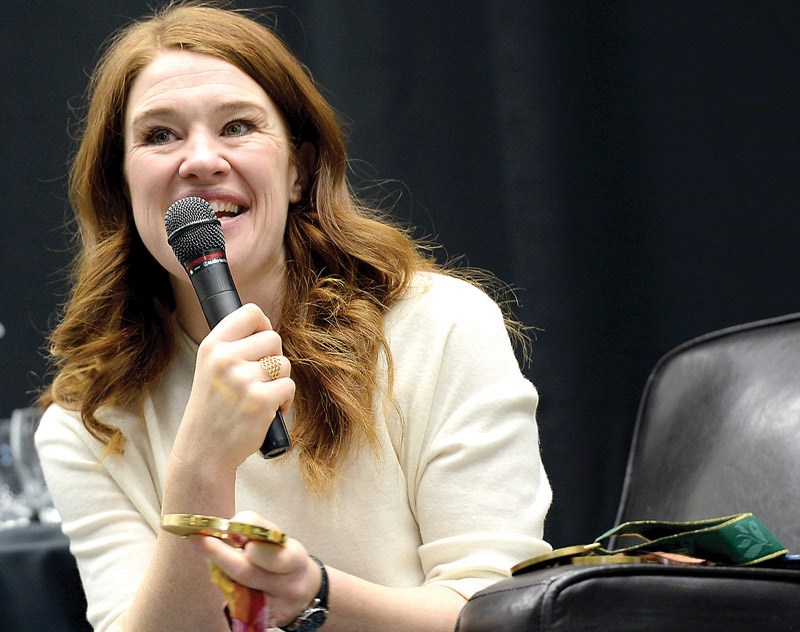When Clara Hughes took the stage at the Northern Sport Centre Wednesday morning she was carrying a bag stuffed with medals.
But as the multi-sport, multi-Olympian told the nearly 1,100 students in person and those watching a live stream of the event from 12 schools in Prince George and around the region, all the success and medals weren't enough to drown out issues that had been festering for years.
At her first Summer Olympic Games in 1996, Hughes cycled to two bronze medals.
"I had these Olympic medals that I thought were going to fix what was so wrong inside and so hurtful inside - and they made me miserable," said Hughes, who was later diagnosed with clinical depression. "I went from being an athlete who trained and who raced and who competed and represented this amazing country of ours, to being someone who could only eat, sleep and cry."
It took two years of thinking she was strong enough to beat it on her own before Hughes sought medical help.
"I thought because I had Olympic medals and because I was strong and everyone around me told me how good I was, that there was nothing wrong with me," she said.
It's a story Hughes isn't shy about sharing as the national spokesperson for the Bell Let's Talk campaign, dedicated to the promotion and support of mental health.
Her openness about her past struggles and her willingness to share struck a chord with some of those who came to hear Hughes speak.
For Daniela Johnson, athletic director at Westside Academy, it was a message she wished every student at her school could hear - not just the nearly 50 who attended Wednesday morning - and one she'll be using to set an example.
"It helps me to be a listening ear and just to continue to encourage by example and motivate and support and be transparent to our own students and athletes - [to tell them] that 'you're not alone. You're going to have days and times when you feel not at your optimal, but we all feel that way' and to support and be an example of what that looks like," Johnson said.
Hughes's appearance in Prince George was part of the 50th anniversary celebrations for the YMCA of Northern B.C. In addition to the presentation for students, she also gave a public talk Wednesday night at UNBC's Canfor Theatre.
Hughes truly personifies what the YMCA stands for, said Y Canada president and CEO Scott Haldane, who was in town from his home base of Toronto to interview Hughes onstage.
"We strengthen the foundations of our communities. We do that by nurturing the potential of young people such as yourselves, by encouraging healthy living and by fostering a sense of social responsibility - looking after other people," said Haldane. "And I can't think of anyone in Canada who better exemplifies those efforts to build community than Clara Hughes."
Westside Academy Grade 9 student Kassidy Dreher said she enjoyed Hughes' confidence and that "she wasn't afraid to show her true self."
Having someone come from a less-than-idyllic start and still achieve so much was inspiring, said fellow Westside student Naomi Spyker.
"It makes me believe that even people who have a rough past, they set their hopes to it, can become what they want to be and they don't have to come from a family who will put you on this path," said Spyker, 14. "She came from a troubled family and she is an Olympic gold medalist and it really gave me hope that if I put my mind to it I can be really anything I want to be."
During her presentation, Hughes emphasized the importance of finding a connection to sport or other activities as a mental health tool.
Hughes discovered speed skating at the age of 16, while watching four-time Olympic medalist Gaetan Boucher compete in the Calgary Games.
At the time, Hughes was still in her hometown of Winnipeg where she had dropped out of school and was heading down a dangerous path that included taking up drinking, doing drugs and smoking by the age of 13.
Inspired by Boucher, she fell full-speed into the sport. It was by chance that she took up cycling and made it to an Olympic level by 1996. Hughes returned to speedskating with great success, becoming the only Canadian athlete to medal in both the Summer and Winter Olympics. She brought home the bronze in the 5,000-metre at the 2002 Winter Olympics in Salt Lake City, gold in the same event at the 2006 Games in Torino, as well as silver in team pursuit. In 2010 in Vancouver, she carried the Canadian flag for the opening ceremonies before claiming bronze in the 5,000m.
Hughes competed in the 2012 Summer Games in London before wrapping up her Olympic career.
"And I'm not sitting here telling all of you in this gymnasium and all of you by video to become Olympic athletes - that happens for very few people," Hughes said. "It's the connection that matters. And if I had only gone as far as the provincial team, it changed my life... So everyone of you out there, that's what I try to encourage - activating yourself and connecting to something that lets you express yourself. "
"I was overwhelmed with emotion with what she was saying," Johnson said. "As a person who is involved in sport and coaches and teaches P.E., I try to tell athletes how similar sport and life can really be and she just really hit the nail on the head when she had said how it had changed her life and was a true motivator for her to go out and do great things, not only in the sport, but in the community and to inspire other people to be able to reach for the stars."



